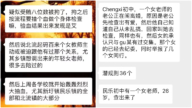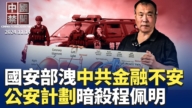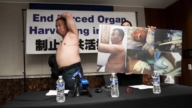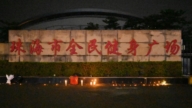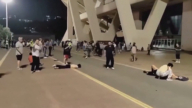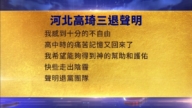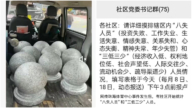【新唐人2012年12月21日讯】“中国社会科学院”日前发布了第二部“反腐蓝皮书”,指称中国腐败花样层出不穷,反腐形势严峻。但蓝皮书表示,近60%的中国城乡居民,对今后5到10年的中国反腐败工作,取得明显成效有信心。不过,民间的真实感受却有不同。来听听他们怎么说。
“中国社会科学院”经过对各行业人士的调查问卷,12月19号在北京发布《中国反腐倡廉建设报告No.2》,报告说,2011年,全国纪检监察机关共处分县处级以上干部4843人,追回财产84.4亿元。
蓝皮书指出:“在全球化背景下,资源、资金、文化、信息等都在跨国快速流动或整合,借助现代信息技术条件,腐败的表现形式也发生了新的变化,比如:腐败主体从个体向集团化蔓延,窝案串案较严重;腐败手段从显性向隐性扩展,曲线收钱、迂回敛财、花样翻新。”
但蓝皮书声称,近60%的中国城乡居民,对今后5到10年的中国反腐败工作,取得明显成效有信心。这与2011年相比大体持平,略有上升。
因实名举报腐败而受到打压的天津张姓市民表示,中国社会的腐败已经无法控制,现在各行各业都有潜规则,官员都在变相洗钱,社科院的资料不可信。
天津市民张先生:“我举报也是向中纪委多次反映,没有用,他连信儿都不给你回,它连屁都不放。就如同现在访民受了冤屈一样,你看看拆迁暴力,那个警察作恶打死、打伤的那些访民们去北京告状,有用吗?没有用。为什么没有用啊,儿子作恶了,你上他作恶的老子去告状,那能告的赢吗?”
张先生质疑,中共现在连官员的财产都不敢公布,是真心反腐吗?他说,中共反腐只是作秀,这就是为什么最近20年来,当局越反腐越腐败的原因。
民间反贪人士、上海律师郑恩宠夫妇日前遭到警方传唤。郑恩宠认为,警方传唤与他连署要求官员财产公示有关。
“德先生研究所”北京成员、律师李景林也指出,“中国社科院反腐蓝皮书”的结论,“不具备真实性和权威性”。民间法律工作者李向阳也不赞同“蓝皮书”的说法。他认为,中国共产党的反腐倡廉还是换汤不换药,既用贪官,又杀贪官,根本不能治标又治本。
虽然,“十八大”后一批高官落马,而且,中共媒体透露,在层出不穷的腐败新表现中,“美容会所成贪污高发地”,北京就有12名女性官员因此落马。报导同时指出,这种新型的“美容腐败”潮流极具隐蔽性。但是,日前,学者呼吁,反腐“不只三把火”,要烧更多火,中共新任中纪委书记王岐山回应说,更希望的是“润物细无声,不大搞动静”。
北京“佳法律师事务所”民权律师兰志学认为,从当局动作来看,还是“维稳压倒一切”的思路,无力反腐。
民权律师兰志学:“这种靠一个执政党自身来反对腐败,这本身就存在一个问题:自己监督自己、自己反对自己的腐败。反腐还得靠制度,得有一个健全的制度,得有科学化的、民主化的、人权化的这种监督机制。”
天津张姓市民还认为,很多高官之所以被揭露出来,是内部利益集团争斗的结果。他认为,反腐需从开放党禁、报禁做起。
兰志学也指出,真正反腐,需要老百姓参与,需要媒体参与。但目前连对言论自由、公民表达权的限制都不解除,就让大家强迫相信他们反腐有力度,这很难说服人。
张先生认为,只有废除一党专专制,反腐才有希望,才能从根本上解决问题。
采访/朱智善 编辑/宋风 后制/肖颜
China’s Blue Book Anti-corruption Efficacy Questioned
China’s Academy of Social Sciences (CASS) recently
released the second part of the anti-corruption Blue Book.
It claims, the corruption take many shapes and forms,
and the situation is critical.
The Blue Book shows that nearly 60% of the Chinese urban
and rural residents, have obvious confidence in the anti-corruption work of the last 5 years.
However, the true feelings of the people are not the same.
Let’s take a look at the report.
CASS released ‘China Anti-corruption Construction Report
No.2’ on December 19th, after a questionnaire investigation of people in all industries.
The report says, in 2011, the national discipline inspection
organs sanctioned 4843 county level cadres or above, and recovered a property of 8,44 billion Yuan.
The Blue Book says: ‘In the context of globalization,
ressources, finance, culture, information, etc.,
are all fast-moving multi-nationally, or integrating,
through the modern information technology.
The manifestations of corruption also changed, for example:
the corruption spreads from individuals to groups;
corrupt means changed from dominant to recessive,
circuitously extorting money, etc.’
However, the Blue Book claims that nearly 60% of Chinese
urban and rural residents have obvious confidence in the anti-corruption work of the last 5 years.
This is roughly the same as 2011,
with a slight increase.
Mr. Zhang, from Tianjin, was suppressed,
because of reporting corruption using his real name.
Mr. Zhang said, the corruption of the Chinese society
is impossible to control.
Now, in every industry there are unspoken rules,
officials are all laundering money in disguised forms, and CASS’ information is not reliable.
Mr. Zhang (Tianjin resident): “I reported several times to the
Central Commission for Discipline Inspection – it is useless, they do not even reply.
It is like the petitioners going to Beijing, who suffer from
violent demolitions and end up with the evil policemen killing and beating them, does it work?
It does not work. Why? Because the son has done evil, you
complain to the father, who also does evil, how can it work?”
Mr. Zhang asks, CCP (China’s Communist Party) even dare
not publish officials’ properties, is this anti-corruption real?
He said, the CCP is just putting up a show.
Thus, for the last 20 years, the more anti-corruption work
authorities claim, the more corrupted the society becomes.
The non-government anti-corruption lawyer from Shanghai
Zheng Enchong and his wife were summoned by the police.
Zheng believes, this is related to his petition,
requesting the publishing of the officials’ properties.
Member of ‘Mr. D Institute’ and Beijing lawyer Li Jinglin
pointed out, the conclusions of CASS’ Blue Book ‘do not have the necessary authenticity and authority.’
Li Xiangyang, who works in the field of Law,
also does not agree with the arguments in the Blue Book.
He thinks, CCP’s anti-corruption work is the same as before,
they use corrupted officials to punish corrupted officials, this cannot solve the problem from its roots.
After the 18th CCP congress,
many senior officials were dismissed.
CCP’s media revealed, among the endless corruption string,
‘the beauty club has developed into high corruption place.’
In Beijing, 12 female officials were sacked,
because of this.
This new form of ‘beauty corruption’
is fashionable and invisible, the repost says.
However, scholars have called for more motivation,
when implementing anti-corruption measures,
The Central Commission for Discipline Inspection’ secretary
Wang Qishan hopes that anti-corruption will not turn into a big movement.
Beijing ‘Jiafa Law Firm’ lawyer Lan Zhixue believes,
the authorities measures are still part of the routine for ‘maintaining stability,’ as they can’t fight corruption.
Lan Zhixue: “As a ruling party it can’t fight corruption,
since it monitors itself, it has to fight its own corruption.
Anti-corruption has to rely on external systems. There must
be sound systems, scientific, democratic, human rights, etc., to implement and oversee the mechanism.”
Mr. Zhang also believes, many senior officials were exposed
only because of internal interests groups’ fights.
He thinks, anti-corruption should start with opening up
the party and the censorship.
Lan Zhixue also points out that the real anti-corruption
needs the participation of the public and the media.
Now even the freedom of speech,
and the basic civil right of expression are restricted.
It is difficult to convince people,
that the anti-corruption measures are effective.
Mr. Zhang believes, only through abolishing the one-party
authority can there be a hope for anti-corruption measures, that can solve the problem fundamentally.


